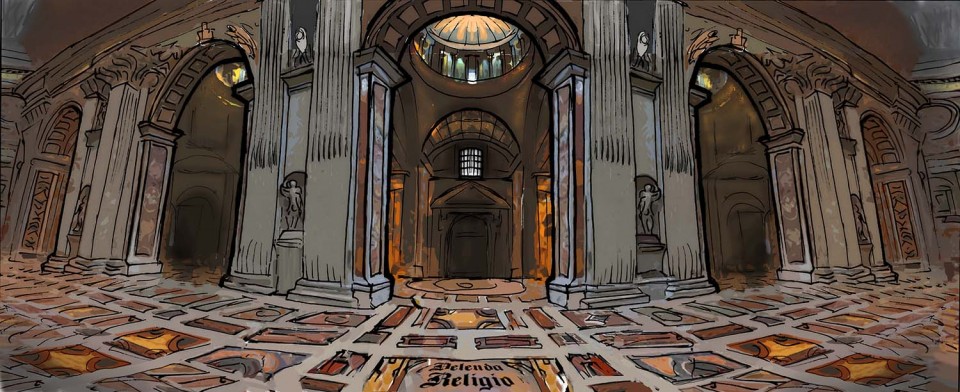108/227. My Book pp. 154-156. Post No. 1387.
MY COMMENT :
An open letter to my contemporaries still stuck in the priesthood. They deserve our pity. I checked in my chasuble at age 31. They are all too old to do that now. They have become totally dependent on the Church they served and continue to serve. Can they admit, at least to themselves, that they should have done what I did ? Even if they do, they are prisoners of their pusillanimity. It would be cruel of us to put salt into their open sore, and unpardonable of me to gloat.
**************************
Dear Reverend Father,
You have been wandering in the desert for the last four decades. You’re lost, and you don’t even have a Moses to guide, encourage and lead you out. Forty years ago (time of writing) I abandoned the priesthood. The final step – atheism – took me another ten long years. It is no doubt too late for you, dear colleague, ordained like me in the sixties, to put the last forty years behind you, and achieve like me freedom from the illusions of a supposed, divinely inspired sacerdotal vocation.
None of us will live much longer. I think four score and ten is a reasonable limit for most of us (if I make eighty, I’ll accept your congratulations). But seriously (I was going to say “honest to God”), before you die, how do you feel about having stuck with it so long ? I could have been in your mocassins, Franciscan sandals or sacerdotal shoes. I got out when I was thirty-one (OK, the final break was at forty-one, when I “abandoned the faith”.) You are too old now. You cannot survive financially without the pension, health-care and retirement-lodging provided by your employer, the Church. You cannot afford, after all those years, to throw away the privileges you have acquired. You need the Diocese (or your Order) and its protection. You cannot count on your parishioners, who are as old as you are. You can count only on diocesan funds (or those of your religious order) to look after you till you die.
But before you settle into a more or less comfortable, secure, medically supported environment, have you the courage to ask whether your last forty years make any sense ? You don’t have to tell anyone. You don’t need to write a book, even an article, or a letter to the “Catholic Weekly” or even a Parish Bulletin. But to respect the honesty you spent your life preaching, can you, at least “sub rosa”, confidentially, between you and me and the gate-post, admit to yourself that you should have hung up your chasuble years ago ?
Meantime, don’t do anything rash. You missed the bus, that’s all. I was one of the ten thousand lucky priests to have been able, forty years ago, to give myself a life as a layman, a husband and a father, Father. I would thank God for it, if He happened to exist.
Dear Father – it’s a bit odd that I should continue to address you like that, but we both come from a long (if not always New Testament-approved) tradition . . . All this might sound to you like “schadenfreude”, gloating over my good luck, lording it over you for your blindness and lack of courage. I must admit, in your place, I would not much appreciate what you have just read. Let sleeping dogs lie. “Primum non nocere”. In France we say you should not shoot at ambulances. Your life has been difficult and these last decades frustrating enough, not to have to listen to a former priest declare that you have wasted the last forty years of your life.
I could have omitted this Reflection. But its raison d’être, Father, is not really you. Your future, like mine, is behind you. Your life and mine are what we have made them. Thousands of parishioners are grateful to you for your unselfish service, for reinforcing their faith, for giving them reasons for living and hoping, for providing them with meaning for their lives and even their death. (We may not agree that all this is, in my view, “sine fundamento in re” (“without any foundation in reality”), as we used to say in the seminary. You continued to proclaim myths. I decided to tell the truth. These are intimately personal perceptions, personal decisions. I respect yours. I hope you respect mine.) You fed the poor, you helped the needy, you visited the sick, you offered a vision to the living and consolation to those grieving the loss of their loved ones. You have been a servant of God and of His people.
No, Father, I do not want to plunge you into despair. I simply want to warn future generations not to make the mistake you and I made. If this Reflection gives pause for thought to even one young man who imagines he has a “vocation” to the priesthood, it will have been worth the effort, if not the unfortunate cost and regrettable collateral damage to you. We are – or should be – the Last of the Mohicans. We owe it to young candidates for the priesthood to help them to wake up before it is too late. I don’t expect you to accept or even understand all this. In a way, so much the better – for you. I will perhaps have succeeded in dissuading some of those tempted to follow us into the dead-end street which is the sexless, meaningless priesthood, but not in destroying your illusions. Meantime, enjoy your retirement. You deserve it.
RIDENDA RELIGIO
